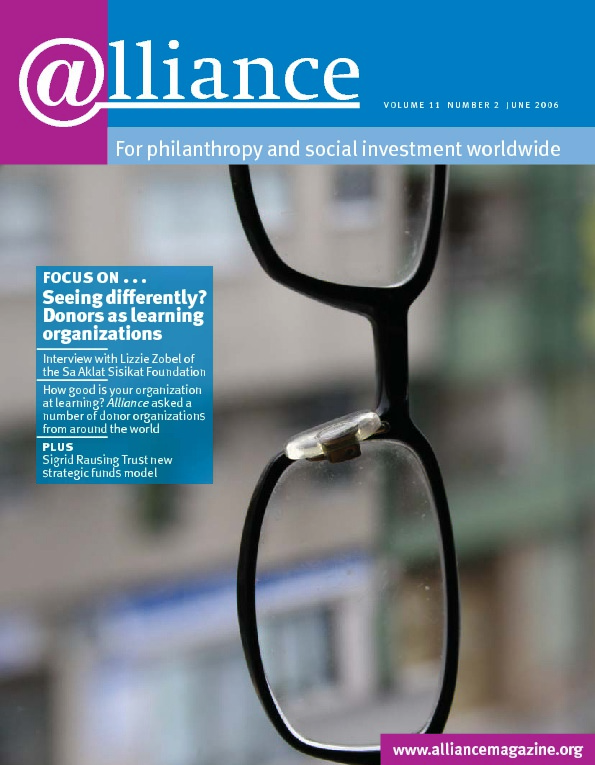Essentially the proceedings of two one-day seminars held in January 2005, this book is a most valuable resource, not least because it is an example of the sort of creative, stimulating investment in learning that foundations can but so rarely do make. Instead of the usual process of consulting with UK-based development professionals, the Baring Foundation invested in having representatives of local partners of Baring grantees tell their stories in the seminars. The resulting case studies and commentary do indeed offer valuable learning.
From 2001, the Baring Foundation’s international programme focused on long-term migration and displacement, making a few relatively large grants each year. Arising out of this work, which covers a wide range of issues – economic migrants, street children, forced relocation of people, post-conflict returnees, among others – the Baring Foundation identified capacity-building as a key theme. They also recognized that building capacity in unstable situations brings its own particular difficulties.
The book focuses on three issues: building capacity where civil society has broken down; the role of NGOs where government is weak; advocacy, or engagement at the grassroots. It presents three rich case studies on each of these issues, plus an excellent overview by John Twigg. The case studies are varied: from education in southern Sudan to post-traumatic stress disorder in Peru; from child trafficking in West Africa to the disability movement in Angola. In each there is a focus on lessons learned and thoughtful analysis of future needs.
So what of the lessons learned? Experienced development professionals reading this book will find many generic themes with which they are familiar: the importance of involving local people in planning; regarding capacity-building as a process and not an event; involving multiple stakeholders; careful needs assessment; the need for grassroots action and national/international advocacy; the critical role of NGOs in highlighting and creating space for ‘invisible’ problems. However, alongside these general lessons, the book is very strong on illustrating the impact of the unstable context on capacity-building work.
Where civil society has broken down (not that it ever disappears), new groups start to appear, often – according to this particular case study of Sudan – more genuinely representative of people than before, but in need of very basic capacity-building inputs. We are reminded that in such situations funders should not ignore the pressing need for basic equipment and facilities.
Where government is weak, the usual well-defined spheres of action and interaction are blurred. While there are more dangers for NGOs in such contexts, their role in conflict resolution can be critical. Similarly, in confrontational political environments, advocacy is difficult and can be dangerous, and it is essential for actors to build mutual trust as a basis for engagement. It is also essential for NGOs to be as flexible as possible, and to seek to collaborate widely.
As valuable as this resource is, there are several contextual elements of unstable situations that are not addressed and that are known to affect the work of NGOs. First, it would have been interesting to hear the views of the local partner NGOs, most of which have been active for many years, on the sudden influx of ‘new’ international NGOs and aid contractors that a peace treaty brings. All too often, these INGOs absorb vast amounts of aid for programmes in communities of which they know nothing.
Similarly, although there was reference to the emergence of new groups when civil society breaks down, this was represented in positive terms. We know from experience in the Balkans, the aftermath of the recent tsunami, and so many other crises and post-conflict situations, that the mushrooming of local NGOs and CBOs includes many opportunistic groups without constituency or capacity.
Another missing element was any serious assessment of the role of the private sector in unstable situations, especially the large multinational corporations (though there was reference to the logging industry in the Congo Basin).
But these omissions should not deter anyone from reading this book. It set out to profile work on the ground and draw out lessons for future practice, and it succeeds in doing so.
Andrew Kingman is Chief Executive of Allavida. Email akingman@allavida.or.ke
Filling gaps and making spaces: Strengthening civil society in unstable situations John Twigg (ed) Baring Foundation Free download
To download
Go to http://www.baringfoundation.org.uk/publications.htm





Comments (0)